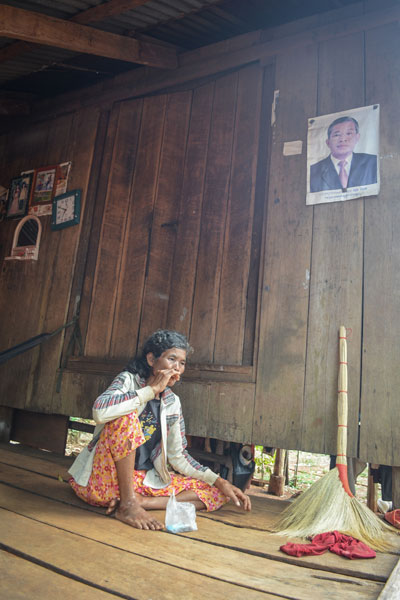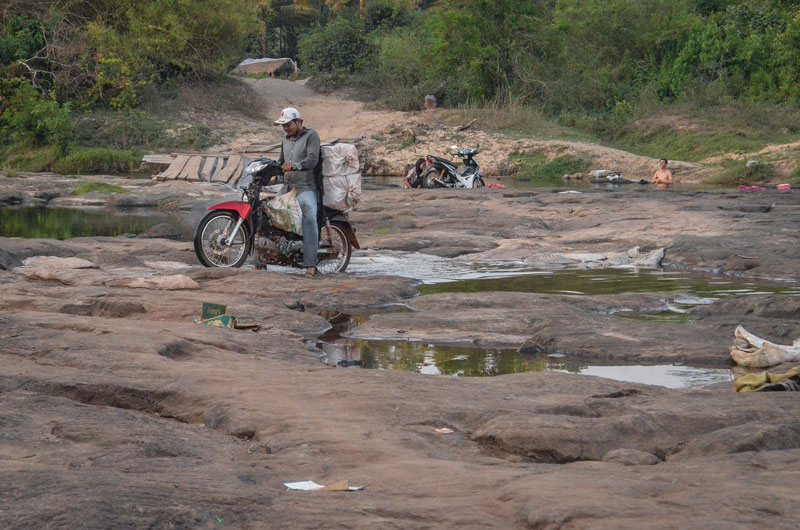THMA BAING DISTRICT, Koh Kong province – The government may have succeeded in deporting outspoken activist Alex Gonzalez-Davidson earlier this week, but support for the environmentalist and his cause remains strong in the remote valley he sought to spare from a proposed hydroelectric dam.
Mr. Gonzalez-Davidson and his NGO, Mother Nature, had been campaigning for the past year against a Chinese-backed dam that would flood much of the Areng Valley, forcing hundreds of ethnic Chong families off their ancestral land and wiping out the habitat of several threatened or endangered animal species.

The Interior Ministry deported the Spanish national on Monday after refusing to renew his visa on the grounds that he helped set up an illegal road block on the main route leading into the valley in September, hoping to keep developers out.
The NGOs and unions that rallied around him said the ruling CPP simply wanted him out of the way so that it could push ahead with the dam.
Either way, Chong villagers in the valley this week said they were upset to hear that Mr. Gonzalez-Davidson had been expelled and supported his work on their behalf —despite a petition authorities had brought around in search of his enemies.
Hoeng Pov, who often worked by the activist’s side, said district officials came through Chumnap commune, one of three communes in the valley, during Chinese New Year looking for villagers to endorse a petition supporting Mr. Gonzalez-Davidson’s deportation.
“Nobody signed it here,” he said. “We know the [local] authorities signed it, but the villagers did not.”
But at least one resident did.
“[Authorities] were asking villagers if they wanted to kick out Alex,” said Pan Voeun, another villager in the same commune.
“I support what Alex was doing to stop the Chinese,” she said. “But when they asked me to give my thumbprint, I did, because I don’t have a lot of education.”
“We don’t dare to refuse the authorities,” she added. “We don’t dare to refuse because we are on their side, we are CPP.”
It is impossible to know how many people signed the petition. The village chief and a deputy commune chief both said they only heard about it from villagers but were not involved and had not been approached.
“We regret that they kicked him out of the country, because he came here to save the valley,” said the village chief, Has Morn, adding that he believed most of the valley felt the same way.
Deputy district governor Keo Nybora, however, claimed the petition was the villagers’ idea.
“The villagers, they volunteered to do it themselves. The authorities were not involved,” he said.
Asked if he had a copy of the petition and how many of the villagers endorsed it, he said only, “I don’t know.”
If the petition did get any traction, the government failed to publicize it. No one at the Interior Ministry made any mention of it in the days leading up to Mr. Gonzalez-Davidson’s deportation or in the days since.

As for the dam, plans are progressing apace.
On Tuesday, Prime Minister Hun Sen, who only recently played up the dam’s potential benefits, said it would not be built sooner than 2018.
But at the same time as villagers in Chumnap commune were being asked to endorse Mr. Gonzalez-Davidson’s expulsion, those in Thma Donpov commune—also in the proposed dam’s path—were being asked to support a fresh study of the project’s potential impact.
“The village chief came to ask me if I support the study; I said I didn’t,” Meach Penh recalled.
“If they study, it means the dam will be built,” she said. “And if the dam is built, it means the water will be dirty, and we will lose the crocodiles and the dragon fish and the forest.”
Ms. Penh’s aunt, however, did sign on.
Nhoek Chi can neither read nor write Khmer. But when the village chief approached her with the letter, which was written in Khmer, she thumbprinted it anyway.
“I don’t support it…but they told me that all the families said yes, so I followed,” Ms. Chi said, adding that she dreads the thought of giving up her ancestral home.
“I followed because I can’t read or write Khmer, so I just did what they said.”
The village chief could not be reached for comment, but Thma Donpov commune chief Keo Sarun claimed that most of the roughly 150 families in the commune gave their support for the study. Of the 100 families he asked, only five turned him down, he said.
“We did not force them; it was voluntary,” he said.
Mr. Sarun said he did not have a copy of the letter or the thumbprints, however, because he had already sent them on to district officials.
Mr. Nybora, the deputy district governor, said he knew nothing about the letter. But he said researchers would be heading into the valley to start the impact assessment soon.



